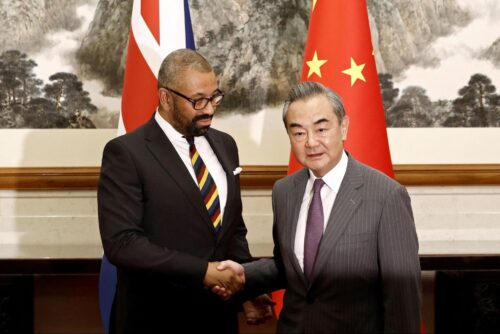The U.K.’s BNO scheme, one year later
A year into its inception, a visa program introduced by the U.K. has opened a path to work and citizenship for millions of Hongkongers. But much work remains to make the scheme more inclusive and resettlements easier.

In January 2021, the United Kingdom introduced a new immigration program that delivers a pathway to full citizenship for millions of Hong Kong citizens who want to move away amid continued pressure from Beijing on civil liberties. One year into the scheme, although thousands of Hongkongers have taken advantage of the relocation offer, the special program in its current form still leaves behind a significant number of Hong Kong nationals who may be targets of Beijing’s ire.
Since massive pro-democracy protests broke out in Hong Kong in 2019, more than 10,000 people have been arrested over the demonstrations, with many charged under China’s National Security Law, a controversial bill introduced by Beijing in 2020 to crush the local resistance for good. As part of its response to Beijing’s actions, the U.K. extended an olive branch in early 2021 to Hong Kong residents with British National Overseas (BNO) passports and their dependents, allowing applicants to enter on five-year renewable visas.
Under Britain’s colonial rule, most Hongkongers in the 1980s had British Dependent Territories citizen (BDTC) status, a classification of British nationality that gave no travel or residency rights in the U.K. Hongkongers lost their BDTC status on July 1, 1997, when the territory’s sovereignty was transferred from the U.K. to China as a Special Administrative Region. While the 13 other British Dependent Territories — which have been called British Overseas Territories since 2002, including Anguilla, Gibraltar, and the Cayman Islands — were given alternative tracks to British Overseas Territories citizenship, only BDT citizens of Hong Kong could apply for lifelong BNO status in the 10 years preceding the city’s handover. But before the visa changes last year, BNO passports only allowed bearers to travel in the U.K. without a visa, as they didn’t confer the right to live, work, or study in the country.
A mass exodus
Since January 2021, the approximately 2.9 million BNO citizens in Hong Kong and their immediate family members have been eligible to apply for the visa program. Successful applicants can stay in the U.K. for up to five years and eventually obtain citizenship after a sixth year of “settled” status under indefinite leave to remain.
“Hongkongers are flooding into the U.K.,” said Carmen Lau, a former pro-democracy elected councilor of Hong Kong who moved to the U.K. on the BNO scheme last July. According to a survey by the University of Oxford’s Migration Observatory, 186,000 Hongkongers applied for BNO entry visas in 2021, with an estimated 380,000 more to apply in the next five years. While Hong Kong citizens pounced on BNO visa applications, Beijing stopped recognizing BNO passports as a valid travel or identification document.
The first wave of Hong Kong migrants on the scheme have so far tended to be educated professionals arriving with families, with 80% of the survey’s respondents saying they were motivated by prospects for their children in the U.K. Fung Wai-wah, the head of Hong Kong’s Professional Teachers’ Union (PTU), told Radio Free Asia that many parents began extracting their children from Hong Kong schools after the government ordered curriculum changes to include the National Security Law, and began closely monitoring teachers and students holding opposing views. “Teachers can lose their teaching license if someone complains about their professional conduct, so they are under huge political pressure,” he said.
Fung’s observation is supported by a survey conducted by the Home Office, which found that 91% of children of BNO visa holders living in the U.K. are between the ages of 4 and 15, the age of formative education.
Building a new life in Britain
While the majority of newcomers had secure jobs in Hong Kong before their departure, integration into the U.K. workforce has not been easy for them. A survey conducted by Hongkongers in Britain, a U.K.-based civil society organization, found that while 94% of BNO migrants had left jobs in Hong Kong to move to the U.K., only 30% of them had landed U.K.-based paid employment.
Language is not the only barrier for them to enter the British labor market; cultural differences can also exacerbate their job prospects. “It took me time to get used to the workplace culture here in the U.K.,” said Lau, who spent the first three months of her time in the U.K. finding her bearings. “I’ve found it a bit of a culture shock.”
After Lau moved to London, she could no longer work in politics. She found work with Royal Mail, the British postal service, during the Christmas rush, and now works part time in a bubble tea shop. Despite her political experience in Hong Kong, she remarked, “Employers in the U.K. care more about your personality and how you express yourself than your qualifications and work experience.”
Lau is not alone in trying to find a new professional footing in the U.K. The aforementioned survey showed that nearly 81% of employed BNO arrivals were looking to move sectors or find other job opportunities. “I’m still looking for a permanent and full-time job here in the U.K.,” Lau said, adding that she is open to new career options.
While Hongkongers with financial privilege may weather the difficulties of integrating into a tough labor market, there are concerns about how younger, less experienced Hongkongers would cope in the U.K. “Living in Hong Kong was expensive, but I had a good job to support me there,” said 28-year-old Alex, who preferred not to give his full name and arrived in the U.K. last September on a BNO visa. Fearing potential rioting charges, Alex, who was briefly detained for protesting on the Hong Kong streets in 2019, left his marketing role at a bank in Hong Kong last June. He now works for a green grocer distributor in Lewisham, in southeast London, where he is based. “My English just isn’t good enough. It has been really depressing,” he said.
Closing the loophole that leaves out the most vulnerable
Despite the challenges Hongkongers face when settling into life and employment in the U.K., many saw it as the only safe option. “We came here on the BNO scheme, but we’re already a group of lucky people,” Lau commented.
The current BNO visa program offers two immigration routes — one for BNO passport holders, and another for their family members, which might include adult children born after the handover of Hong Kong. Under the current BNO immigration policies, applications for a household member visa must be tied to an application by a BNO status bearer, which leaves many young pro-democracy activists ineligible for the offer if they are alienated by their families due to political reasons.
A report by U.K.-based advocacy group Hong Kong Watch found that of all those facing politicized rioting charges, 72% of them were under the age of 25. “18-25s are the people most in need of support from international governments,” the report concludes.
Under the National Security Law, prosecution has been harsh. In July 2021, 24-year-old Tong Ying-kit was handed a jail sentence of nine years in the first of the legislation’s landmark cases. He was found guilty of secession and terrorism after driving a motorcycle into police officers while waving a flag that read “Liberate Hong Kong. Revolution of our times.” Other young activists charged with rioting included a 15-year-old boy and three other minors, who were sent to jail for six months for unlawful assembly and possession of an offensive weapon after being found with a laser pen at a protest. Rioting charges routinely sentence people to five to six years in prison, and these disproportionately affect under 25s.
“I would only be able to move to the U.K. on a BNO visa if I went with my parents,” said Charles Madre, a 23-year-old Hongkonger who is ineligible for the scheme because he was born after 1997. His parents both have BNO status, so he could only move to the U.K. if they applied for the scheme and brought him with them. “Most people don’t have that option,” said Lau. “Some of their parents didn’t support them during the pro-democracy movement, or they do not share the same political ideology as them.”
Calls to close the “loopholes” mounted in November as Parliament voted on an amendment to the Nationality and Borders Bill, a change in legislation that would allow those with one parent of BNO status and individuals aged 18–25 to access the scheme independently.
At the time of the proposed amendment, seven Hong Kong activists in exile penned an open letter explaining the importance of including younger Hongkongers in the scheme and how the narrow parameters of its current iteration had forced a number of them to seek political asylum in the U.K. or pursue immigration options elsewhere. “Please do not leave us and our friends out,” they wrote.
Although November’s amendment was rejected, lobbying by Hongkongers within the U.K. has remained strong. As individual activists continue to speak up about Hong Kong issues, and as more people arrive in the U.K., Madre believes that their demands have already begun to gain traction. “BNO arrivals will become a voting bloc in the U.K.,” Madre said. “If it keeps growing, they can organize themselves and pressure the government to expand the scheme from within the U.K.”
Positive signs are on the horizon. After a debate in the House of Lords on February 10, the British government finally agreed to act on a proposed amendment to the BNO scheme, which, once passed, would allow those born after 1997 to access the special program independently. In a move that will provide settlement for Hongkongers most in need of a lifeboat, the decision will be formalized when the motion is debated at report stage next month.
“What is rather an unhappy paradox is that the people, including members of the police force, doing the persecuting have British passports, and the ones who are being persecuted, the ones who are being locked up, don’t,” former Hong Kong governor Lord Patten was quoted as saying by the Independent. “I think we should address that rather unhappy imbalance in due course.”
While extending the visa scheme comes as positive news to many Hongkongers, Madre, who would be eligible to apply under the amended scheme, is skeptical of the colonial legacy that remains in British parliament. “The House of Lords is packed to the brim with people who lived in Hong Kong,” he said, laughing. “I’m not surprised they’re sympathetic to reintroducing the amendment to allow 18–25-year-old children of BNOs to come in their own right.”
China news, weekly.
Sign up for The China Project’s weekly newsletter, our free roundup of the most important China stories.
The asylum route and new hopes
Simon Cheng, 31, political defector and founder of lobbying group Hongkongers in Britain, explained that the BNO scheme is not only a lifeline for Hongkongers but also a way for the U.K. to reconcile its imperial past. Cheng, who sought asylum in the U.K. in 2019 after being detained and tortured in China following the city’s protests, said, “Hong Kong was the last U.K. colony. It might be their last chance to make a good ending to that history. Would decolonization be complete if they fail to grant Hongkongers their full political rights?”
More Hongkongers will continue to arrive on BNO visas, while those left out will continue to seek asylum. “I know some people seeking asylum in the U.K.,” Lau said. “Not many of them have been granted political refugee status.” Last year, 59% of asylum seekers from Hong Kong were granted asylum in the U.K., according to a report by the House of Commons. “The U.K. government could offer more support to asylum seekers,” she said. “Not just people from Hong Kong, but people from Afghanistan and other countries that are suffering, too.”
This year, Hongkongers in Britain has secured a grant from Trust for London, a U.K.-based independent charitable foundation that aims to tackle poverty and inequality, and to support the practical and mental health needs of those ineligible for the BNO scheme to seek asylum in the U.K. It has also partnered with Groundwork London, a federation of charities mobilizing practical community action on poverty across the U.K., to provide employment opportunities and professional advice for newcomers regardless of their immigration status. The government has also formed 12 “Welcome Hubs” around the country, to provide information and financial support for Hong Kong BNO status holders and their families who settle in the U.K. “They have now started to support us. It is a good start,” Lau commented.
Beyond advocating for legal changes to the visa scheme, the burgeoning civil society of Hong Kong immigrants in the U.K. is finding ways to support new arrivals. “The U.K. government is our government and we are a democracy. We need to speak for the people who are struggling,” said Cheng. Hongkongers in Britain confirmed it will be opening a physical location in central London later this year. In a post-COVID society, it hopes that a new office will better consolidate the Hong Kong community abroad.
A year into the BNO scheme, it is clear that Britain’s newest immigrant group still faces considerable challenges adjusting to unfamiliar surroundings. But as the community grows, more beneficiaries of the immgration program will be able to provide aid and guidance to newcomers, allowing the scheme to reach its full strength.






